GMDSS Radio Annual Test-Survey-Empower Safety First-2024
GMDSS Radio Annual Test-Survey-Empower Safety First-2024
Table of Contents
ToggleSafety Radio Annual Survey :
Welcome to Safety First (Pvt.) Ltd.: Your Partner in GMDSS Equipment Annual Testing in Chittagong,Mongla & Payra-Bangladesh.
As per the regulations of SOLAS 1974, as amended, all ships of 300 gross tonnage and above, along with passenger ships of any size on international voyages, must be equipped with the Global Maritime Distress and Safety System (GMDSS) radio equipment. This equipment requires an annual thorough inspection, conducted according to the guidelines specified in IMO Resolution A.1156 (32) and other relevant national legislative instruments.
At Safety First (Pvt.) Ltd., We specialize in ensuring the safety and compliance of maritime vessels through comprehensive annual testing of Radio Equipment under the Global Maritime Distress and Safety System (GMDSS). Based in Chittagong, Bangladesh, our services encompass a wide range of critical GMDSS components, including AIS, EPIRB, SAT-C, SSAS, MF/HF radios, INMARSAT-C, VHF radios, and SART.
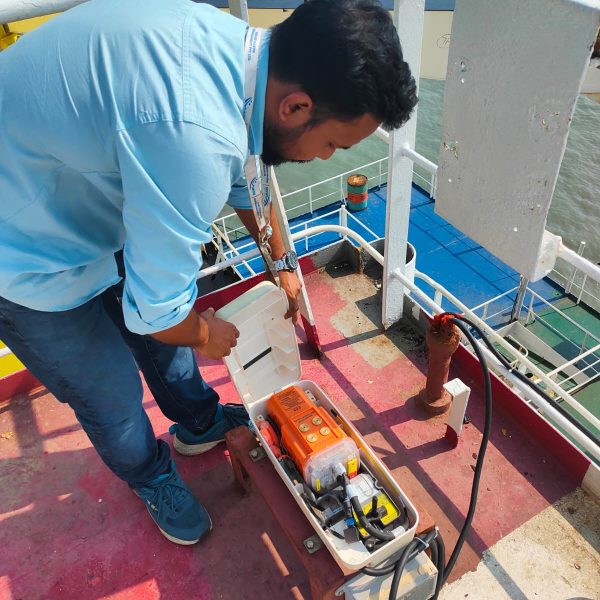
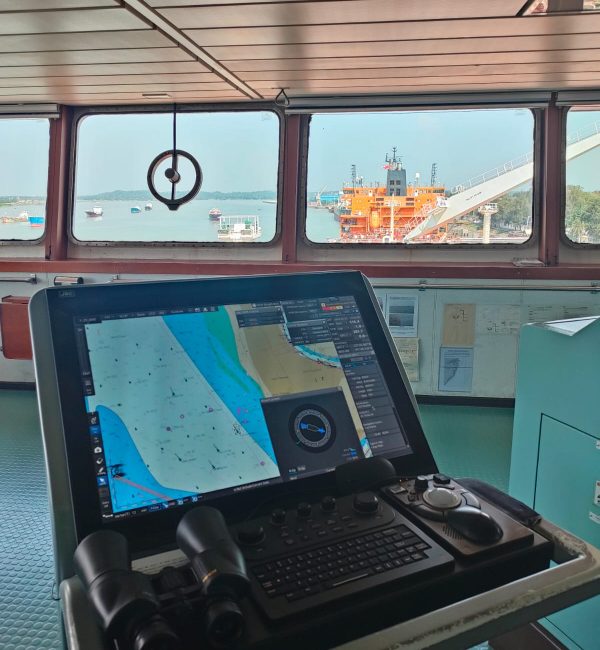
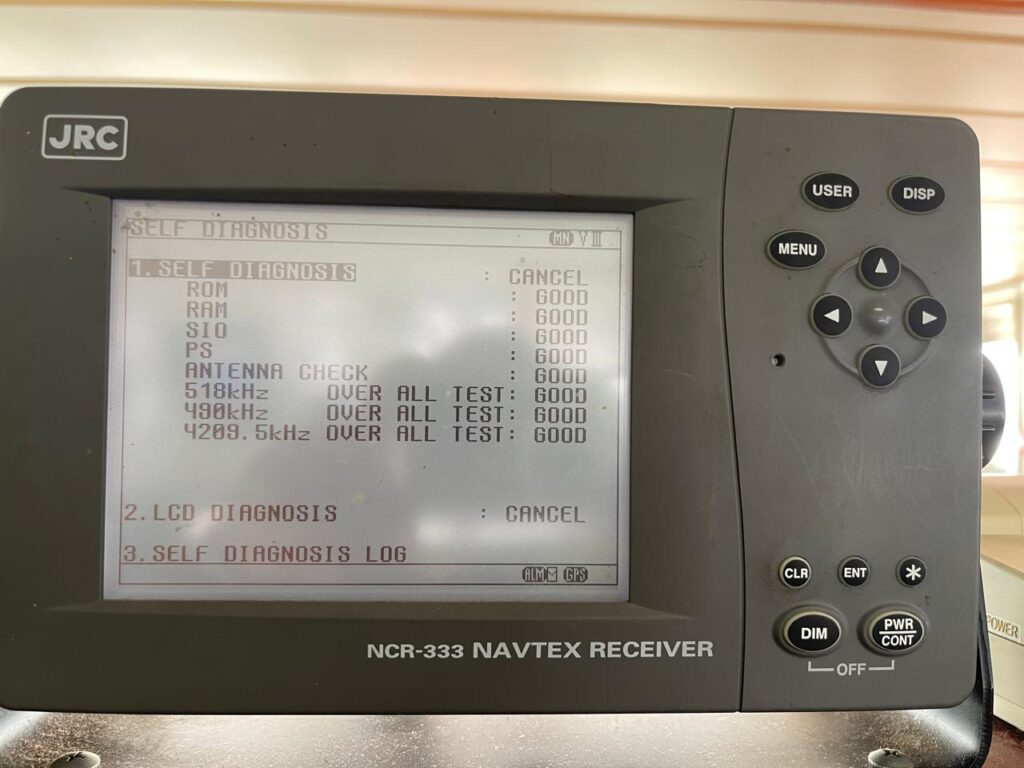
GMDSS Radio Annual Test-Survey-Empower Safety First-2024
Why Choose Safety First (Pvt.) Ltd.?
Safety First (Pvt.) Ltd. is committed to excellence in maritime safety. Our team of certified technicians and surveyors brings years of experience and expertise in conducting thorough annual tests and certifications for GMDSS equipment. We adhere strictly to international regulations and standards, ensuring that your vessels are equipped to handle emergencies and maintain seamless communication at sea.
Expertise and Certifications:
- Our team comprises highly skilled professionals Authorized certified by Various Classes:
- Ensured compliance with international regulations and approvals by various IACS.
Class Approval for Radio Survey:
Safety First (Pvt.) Ltd. Is authorized by major International Classification Society to carry out Annual Radio Safety Surveys.
1. Bureau Veritas (BV)-Approval for Survey & Testing of Radio Equipment
2. DNV Class-Approval for Survey & Testing of Radio Equipment
3. RINA–Approval for Survey & Testing of Radio Equipment
- 4.Class NK–Approval for Survey & Testing of Radio Equipment
- 5. KR Class-Approval for Survey & Testing of Radio Equipment
- 6. CCS class-Approval for Survey & Testing of Radio Equipment
GMDSS Radio Annual Test-Survey-Empower Safety First-2024
Our Comprehensive GMDSS Radio Equipment Services:
AIS Annual Maintenance Chittagong
Regular maintenance of AIS systems to ensure accurate vessel tracking and collision avoidance.
- EPIRB Certification Bangladesh
Certification of Emergency Position Indicating Radio Beacons (EPIRBs) to guarantee functionality during distress situations.
- SAT-C Equipment Service
Servicing of Satellite Communication (SAT-C) systems for reliable data transmission and vessel communication.
- SSAS Annual Validation Chittagong
Validation of Ship Security Alert Systems (SSAS) to enhance vessel security and compliance with security regulations.
- MF/HF Radio Inspection
Thorough inspection of Medium Frequency/High Frequency (MF/HF) radios for effective long-range communication capabilities.
- INMARSAT-C Annual Test
Annual testing of INMARSAT-C terminals to ensure connectivity and operational readiness.
- VHF Radio Equipment Check
Verification of Very High Frequency (VHF) radios for clear and reliable short-range communication.
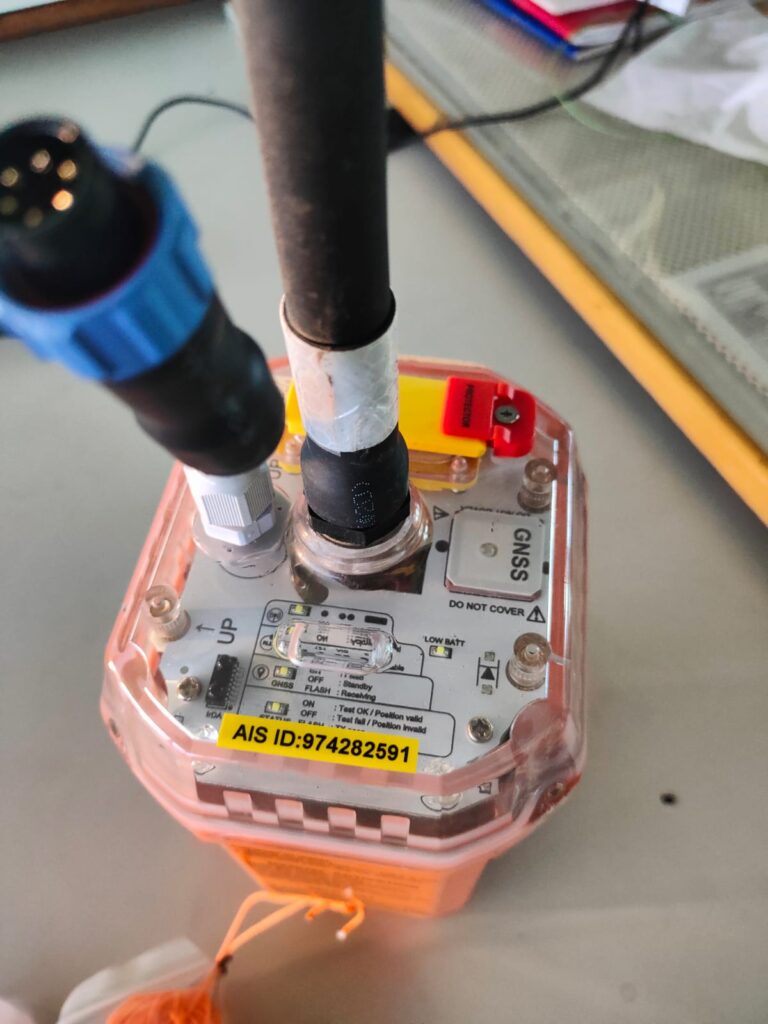
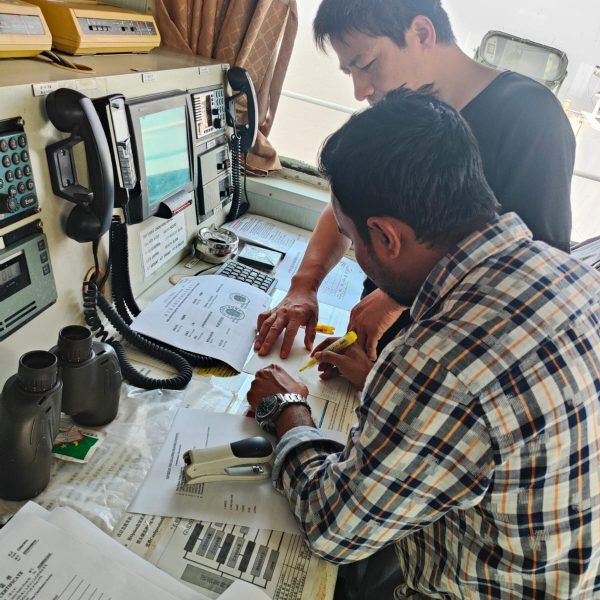
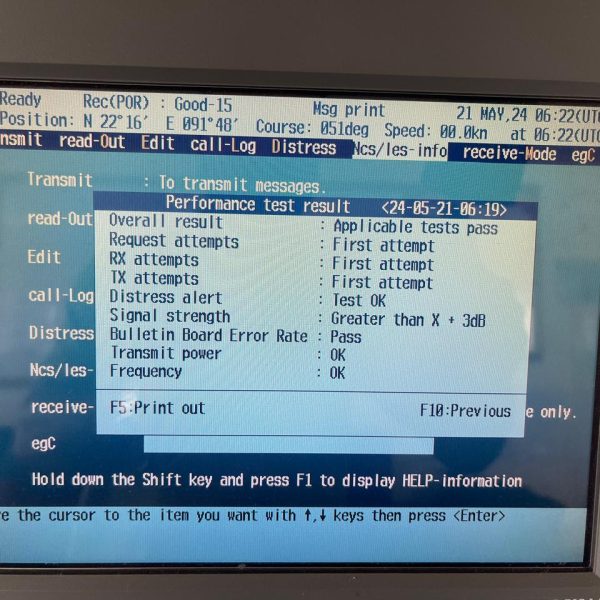
GMDSS Radio Annual Test-Survey-Empower Safety First-2024
Test Process:
The Annual Survey & Test Process
Safety First (Pvt) Ltd. follows a meticulous process to ensure thorough examination and testing of navigational equipment:
- Initial Inspection: A detailed visual inspection to assess the condition of all navigational equipment.
- Functional Testing: Comprehensive functional tests to verify that each piece of equipment operates correctly.
- Calibration: Calibration of instruments to ensure accuracy and reliability.
- Documentation: Detailed reports and certification of compliance with safety standards.
- Recommendations: Expert advice and recommendations for any necessary repairs or replacements.
GMDSS Radio Annual Test-Survey-Empower Safety First-2024
FAQs About GMDSS Annual Testing
- What is SART testing in Bangladesh?
SART testing involves verifying the functionality of Search and Rescue Transponders (SARTs) to aid in locating vessels in distress.
- Why is GMDSS compliance check necessary?
GMDSS compliance checks ensure that vessels meet international safety standards for radio communication equipment.
- How often should AIS undergo annual maintenance in Chittagong?
AIS systems should undergo annual maintenance to maintain accuracy and compliance with maritime regulations.
- What does EPIRB certification involve in Bangladesh?
EPIRB certification includes testing the beacon’s activation mechanism, battery life, and signal transmission strength.
- Where can I find reliable AIS testing services in Chittagong?
Safety First (Pvt.) Ltd. offers trusted AIS testing and certification services in Chittagong, ensuring compliance and operational efficiency.
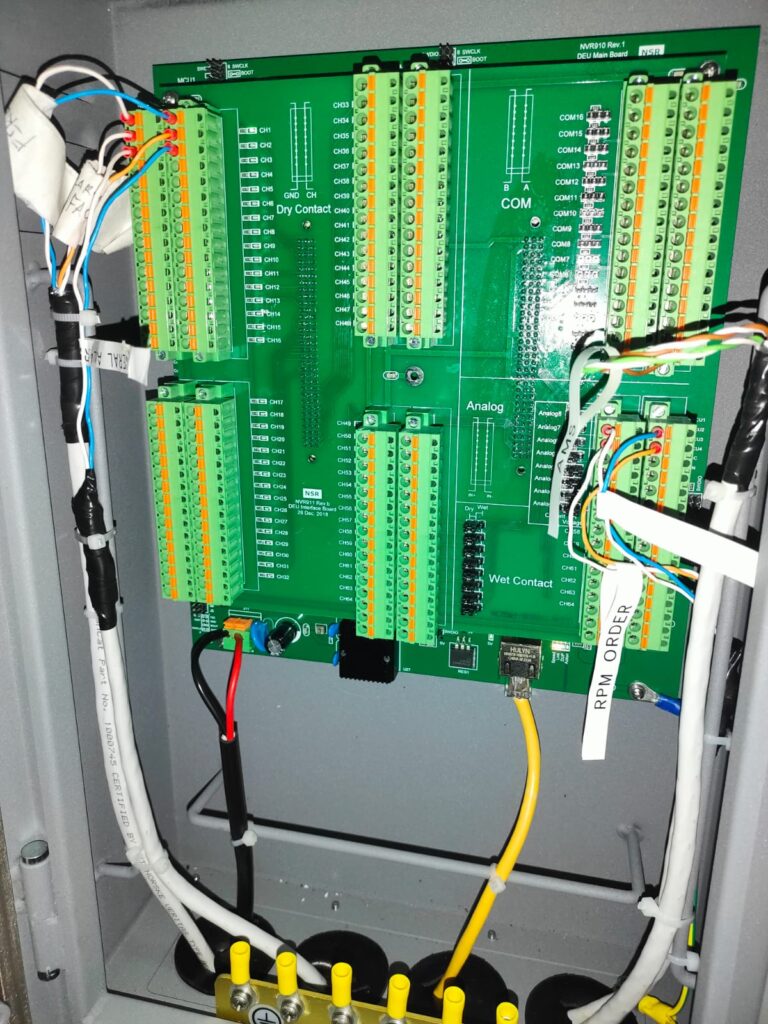
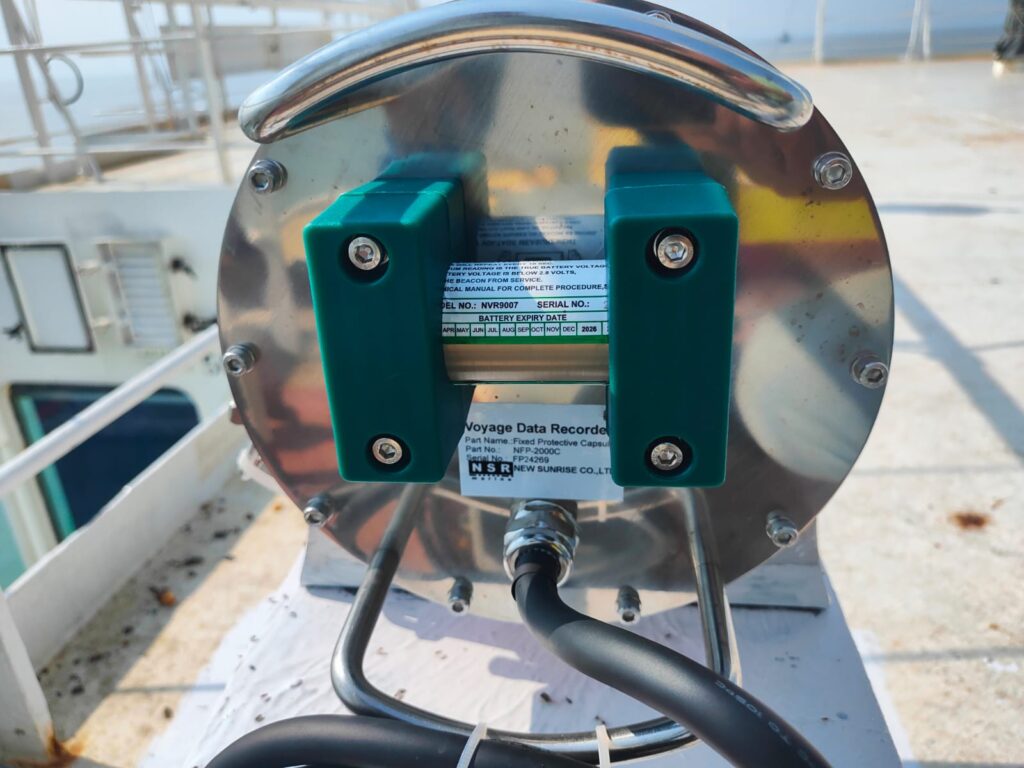
Contact Us
For reliable and professional GMDSS equipment annual testing services in Chittagong, Bangladesh, Contact Safety First (Pvt.) Ltd. today. Ensure your vessels are equipped with the highest standards of safety and compliance.
GMDSS Radio Annual Test-Survey-Empower Safety First-2024
VDR Annual Performance Test (APT) in Chittagong, Bangladesh
Safety First (Pvt.) Ltd. offers comprehensive Voyage Data Recorder (VDR) Annual Performance Tests (APT) in Chittagong, Mongla, Payra -Bangladesh. Our expert team ensures adherence to international maritime standards, conducting rigorous assessments to verify the functionality and compliance of VDR systems onboard vessels
What Is a Voyage Data Recorder (VDR)?
A Voyage Data Recorder (VDR) is a sophisticated onboard device essential for recording and storing critical data related to a ship’s voyage. Similar to black boxes on aircraft, VDRs capture and retain information such as the vessel’s position, speed, audio from the bridge, radar data, and engine performance details.
Why Are VDRs Essential?
VDRs play a crucial role in maritime safety and operations for several reasons:
Accident Investigation:
- VDR data provides vital insights into incidents or accidents, aiding investigators in determining causes and improving safety measures.
Enhanced Safety:
Continuous monitoring of VDR data helps in identifying potential risks and improving overall safety protocols onboard.
Performance Analysis:
Data from VDRs can be used to analyze vessel performance, optimize operations, and enhance fuel efficiency
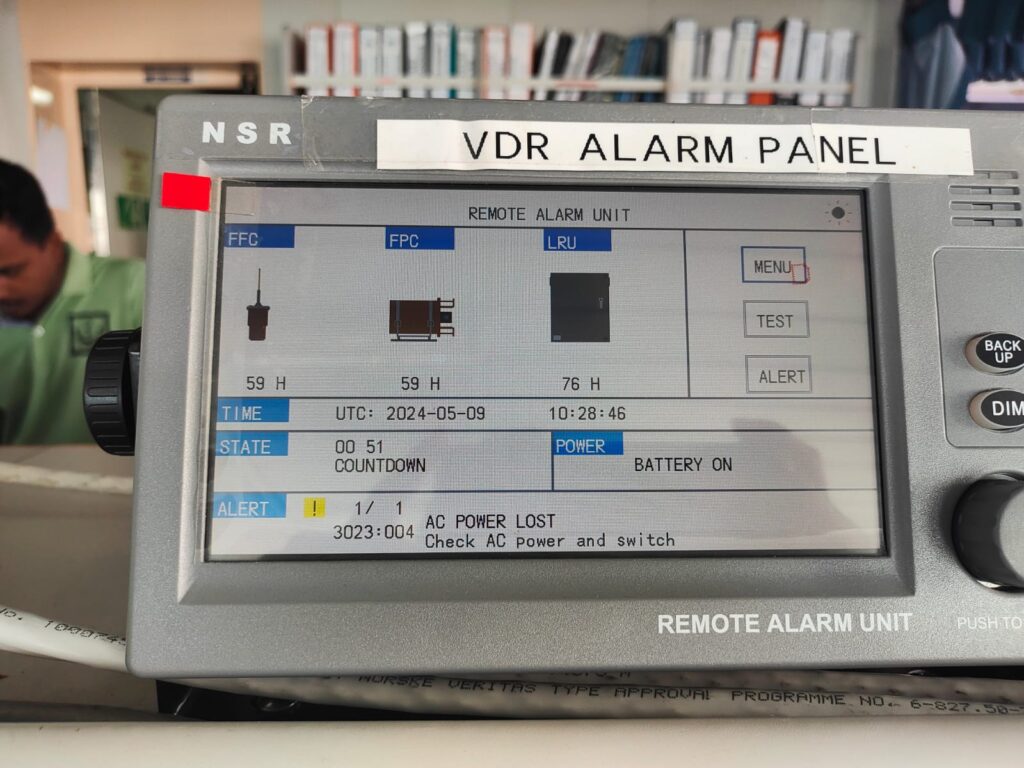
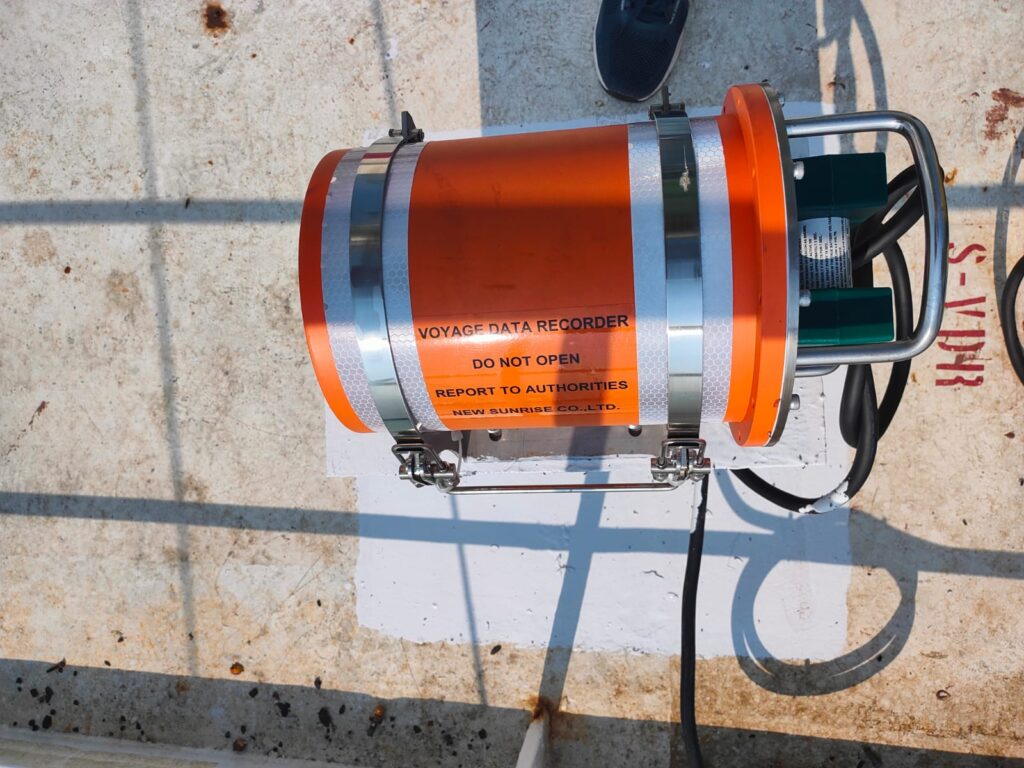
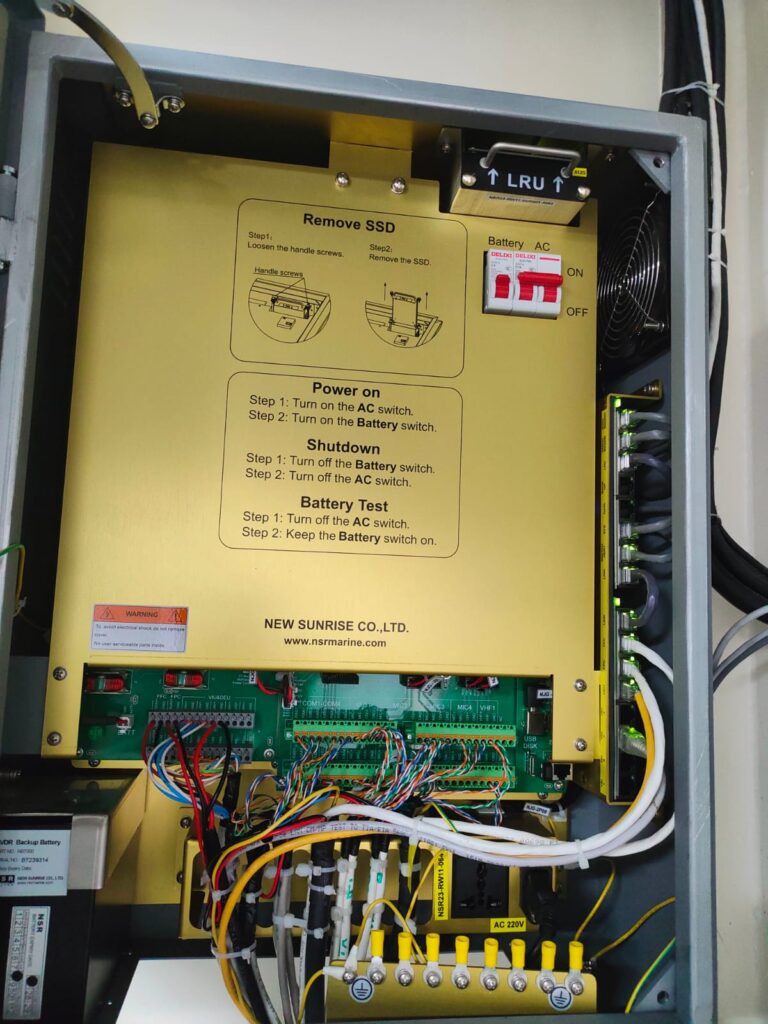
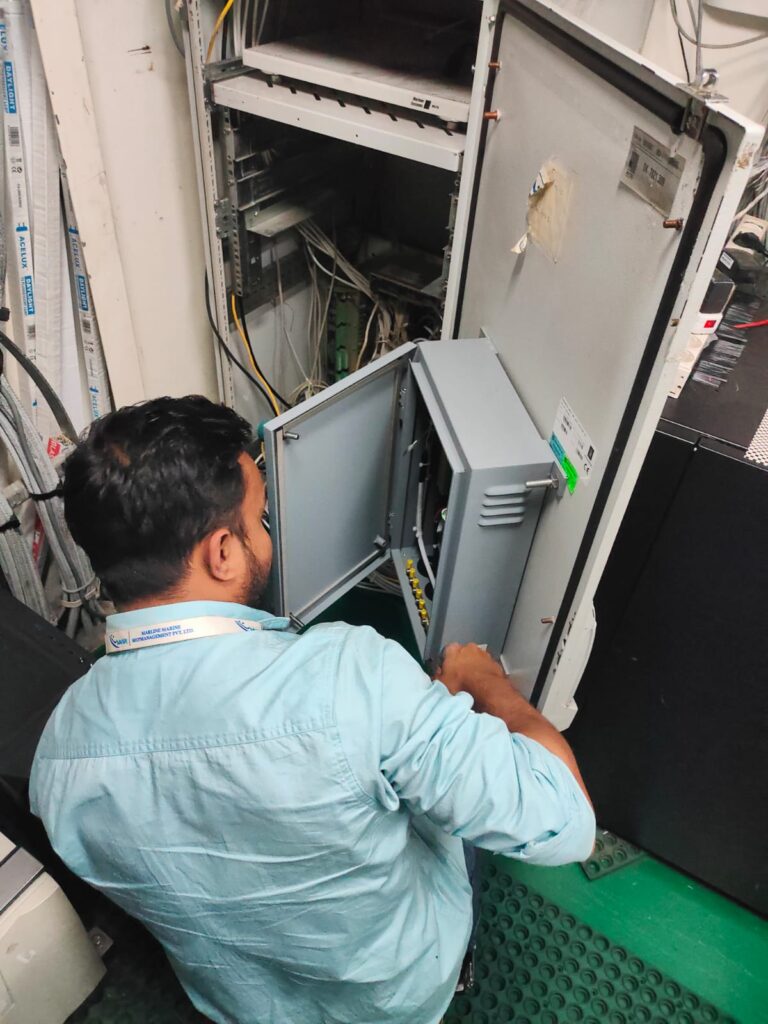
GMDSS Radio Annual Test-Survey-Empower Safety First-2024
Voyage data recorder APT
VDR Recorder Regulations :
The International Maritime Organization (IMO) mandates regulations for VDRs under SOLAS (Safety of Life at Sea) Chapter V, Regulation 20:
Mandatory Installation:
- VDRs are required on passenger ships, cargo ships with a gross tonnage of 3,000 or more, and other vessels as defined by their flag state, constructed after July 1, 2002.
Data Recording Requirements:
VDRs must record and store data for at least 12 hours, including a minimum of 2 hours of audio data that is easily accessible for playback.
Annual Performance Tests (APTs):
- VDRs must undergo annual performance tests to ensure their proper functioning and data integrity.
Who should conduct VDR Annual Performance Tests (APT)?
VDR Annual Performance Tests should be conducted by certified professionals or companies with expertise in maritime safety and VDR technology. Safety First (Pvt.) Ltd. specializes in conducting these tests in Chittagong,Mongla,Payra-Bangladesh, with a commitment to upholding the highest standards of safety and compliance.
Data Recovery:
- VDR data should be recoverable and protected against damage, ensuring accessibility for analysis by relevant authorities.
Empower Safety-GMDSS Radio Equipment Test
Achieving Compliance with VDR Regulations:
- Maritime safety VDR testing Chittagong.To comply with VDR regulations, ship owners and operators must adhere to both international standards set by the IMO and specific requirements from their flag state. Safety First (Pvt.) Ltd. in Chittagong, Bangladesh, specializes in conducting thorough VDR Annual Performance Tests (APTs), ensuring vessels meet regulatory standards and maintain operational safety.
GMDSS Radio Annual Test-Survey-Empower Safety First-2024
Navigational Equipment Annual Survey & Test in Chittagong, Bangladesh by Safety First (Pvt) Ltd.
Ensuring the safety and efficiency of maritime operations is crucial for the bustling port city of Chittagong, Bangladesh. Navigational equipment plays a vital role in this regard, and an annual survey and test are essential to maintain optimal performance. Safety First (Pvt) Ltd. is a leading provider of navigational equipment services in Chittagong, Mongla & Payra -Bangladesh offering comprehensive annual surveys and tests to meet international safety standards.
Importance of Navigational Equipment Maintenance
Navigational equipment, including radar systems, GPS, autopilot, and communication devices, is fundamental for the safe and efficient navigation of vessels. Regular maintenance and testing ensure these systems function correctly, preventing accidents and ensuring compliance with maritime regulations. The annual survey and test conducted by Safety First (Pvt) Ltd. are designed to identify any issues early, ensuring timely repairs and minimizing downtime.
Why Choose Safety First (Pvt) Ltd.?
Safety First (Pvt) Ltd. stands out in Chittagong for its expertise, commitment to quality, and customer-focused approach. Here’s why you should choose their services:
- Experienced Professionals:
- The company boasts a team of highly skilled and experienced technicians who are well-versed in the latest navigational technologies.
- Comprehensive Services:
- Safety First (Pvt) Ltd. offers a full range of services, including inspection, testing, calibration, and repair of all types of navigational equipment.
- Compliance with Standards:
- The company ensures that all surveys and tests comply with international maritime safety standards, providing peace of mind to vessel operators.
- Advanced Technology:
- Utilizing state-of-the-art diagnostic tools and equipment, Safety First (Pvt) Ltd. guarantees precise and reliable results.
- Customer Support: Exceptional customer service and support are hallmarks of Safety First (Pvt) Ltd., ensuring all client needs are met promptly and efficiently.
GMDSS Radio Annual Test-Survey-Empower Safety First-2024
Amendments for SOLAS Reg II-1/25-1 on January 2024
The key amendments to SOLAS Reg. II-1/25-1 Chapter IV on Radio communications, which took effect on January 1, 2024, are as follows:
Amendments to SOLAS regulation II-1/25-1 on water level detectors on multiple hold cargo ships other than bulk carriers and tankers – MSC.482(103).
This new SOLAS regulation II-1/25-1 requires multiple hold cargo ships other than bulk carriers and tankers constructed on or after 1 January 2024 to be fitted with water level detectors in each cargo hold intended for dry cargoes. It harmonizes the requirements for bulk carriers and non-bulk carriers, and will not apply to tankers, liquid holds, and tanks entirely above the freeboard deck. The water level detectors are required to be fitted in the aft end of the cargo holds and should be capable of giving audible and visual alarms at the navigation bridge when the water level reaches a height of 0.3m above the bottom of the cargo hold, and again when the water level reaches a height of 15% of the depth of the cargo hold. The visual alarms should be capable of discriminating between the two different water levels detected in each hold. For cargo holds which are occasionally used for water ballast, an alarm overriding device may be installed. Consequently, the IMO Resolution MSC.188(79)/Rev.1 on “Revised Performance Standards for Water Level Detectors on Ships Subject to SOLAS Regulations II-1/25, II-1/25-1 and XII/12” will enter into force from 1 January 2024 to align with the new SOLAS requirements. Owners with new-built cargo ships (i.e., building contract signed on or after 1 January 2024, or in the absence of a building contract if keel laid on or after 1 July 2024, or if the ship is delivered on or after 1 January 2028), except tankers and bulk carriers, are recommended to refer to the Class rules on design requirements and be guided accordingly.
More generic requirements and definitions are applied to providers of services and technologies used in GMDSS
The monopoly of Inmarsat as the sole provider of satellite GMDSS services is over. In 2020, Iridium was recognized by the IMO. China’s BeiDou has also applied for recognition and may become a third operator in the coming years. Thus, the criteria for the provision of mobile satellite services are revised towards generalization.
References to Inmarsat devices and services were removed from the relevant documents and replaced with definitions that better reflect current realities: “recognized mobile satellite service” instead of “Inmarsat”, for example. Explicit references to providers of Maritime Safety Information (MSI), such as NAVTEX, EGC, are also replaced by more general definitions.
- The definition of the sea area A3 has been changed
In the updated SOLAS Chapter IV, sea area A3 is defined as an area, excluding sea areas A1 and A2, within the coverage of a Recognized Mobile Satellite Service (RMSS) supported by the Ship Earth Station (SES) carried on board, in which continuous alerting is available.
Thus, the sea area A3 varies depending on the type of mobile satellite service:
- if Inmarsat is used, the area remains unchanged;
- if Iridium is used, A3 becomes global (merging of the areas A3 and A4);
- if a regional satellite system is used, the area A3 is limited to the coverage zone of this system.
There is no redefinition of the sea area A4 (this is the remaining sea coverage outside areas A1, A2 and A3), but this area changes for different mobile satellite service providers. That means that the sea area A4 does not exist in the case of a mobile satellite provider with global coverage.
- All the requirements for communication equipment are described in one SOLAS Chapter IV
The provisions concerning two-way VHF radiotelephone apparatus and search and rescue locating devices have been moved from Chapter III (Life-saving appliances and arrangements) to Chapter IV (Radio communications).
- VHF EPIRBs should be replaced by satellite EPIRBs
It concerns the ones which could previously be used in the sea area A1.
NBDP (Narrow Band Direct Printing) is no longer part of GMDSS and is thus removed from all GMDSS equipment requirements
What are the consequences?
The composition of the equipment (including duplicate equipment) required for use in the sea area A3 has changed. The alternative method that involves using MF/HF NBDP communications is no longer valid.
From January 1, 2024, the GMDSS equipment for vessels navigating in the sea area A3 should include a Recognized Mobile Satellite Service Ship Earth Station (RMSS-SES).
Currently (early 2024) there are two such stations to choose from: Inmarsat-C and Iridium LT-3100S.
The relevant certificates and their records of equipment issued/renewed from January 1, 2024, should reflect all these amendments. The re-issuance of SOLAS certificates issued before this date, is not required. They will be valid until their expiration date.
Please note: the implementation of new regulations concerning the channeling arrangements in VHF maritime mobile band has been postponed from January 1, 2024 to January 1, 2028
According to these regulations, all fixed VHF radios used on SOLAS ships must support the display of new 4-digit channels.
The reason for postponing the deadlines is that there are not enough VHFs available for installation that would meet the revised performance standards.
For more information, please find circulars MSC.1/Circ.1676, MSC.1/Circ.1460/Rev.4 and appendix 18 to the ITU Radio Regulations (RR) – Edition 2020.
- The IMO vide Resolution MSC. 496 (105) adopted amendments to SOLAS Chapter IV on Radio Communications, which will come into force from 1 January 2024. The amendments aims to allow the use of modern communication systems in the GMDSS.
- Following are the highlights regarding the amendments to SOLAS Chapter IV:
- References to Inmarsat have been replaced throughout with the term Recognized Mobile Satellite Service (RMSS). In addition to maritime mobile satellite services provided by INMARSAT, the IMO has recognized the maritime mobile satellite services provided by the IRIDIUM SATELLITE LLC.
Note: Iridium Satellite System is acceptable as part of GMDSS, subject to concerned Flag state recognizing Iridium Satellite System as a mobile satellite service for use in the GMDSS.
- The definition of “Sea Area A3” has changed. Sea Area A3 now means ‘an area, excluding sea areas A1 and A2, within the coverage of a recognised mobile satellite service (RMSS) supported by the ship earth station (SES) carried on board, in which continuous alerting is available’. For a ship certified to operate in sea area A3, the Cargo Ship Safety Radio Certificate is to indicate the recognized mobile satellite service in brackets (INMARSAT / IRIDIUM).
- Transmitting and receiving distress and safety communications using direct-printing telegraphy (NBDP) do not form part of the GMDSS requirement and hence need not be fitted on board (redundant).
- The requirement of SART/AIS-SART and two two-way VHF radiotelephone apparatus is now forming part of SOLAS Ch-IV Reg. 7.2 and 7.3 (previously same was under SOLAS Ch-III, Life Saving Appliances and arrangements).
- For sea area A1, VHF-EPIRB can no longer be accepted in lieu of satellite EPIRB.
- The coverage of sea area A3 became variable by the type of RMSS SES installed on board. An RMSS-SES with lesser coverage area installed on board will determine the coverage of sea area A3 as the “Primary system” for a ship.
- The relevant SOLAS related certificates and Records of Equipment are included as part of the amendments.
- Owners/ operators and Masters of ships are advised to be guided by above and ensure compliance to the requirements. For radio equipment carriage requirements for various sea areas, refer attached Annexure -1.
Enclosure:
Disclaimer:
This Technical Circular and the material contained in it is provided only for the purpose of supplying current information to the reader and not as an advice to be relied upon by any person. While we have taken utmost care to be as factual as possible, readers/ users are advised to verify the exact text and content of the Regulation from the original source/ issuing Authority.
Conclusion
For reliable and professional navigational equipment annual survey and test services in Chittagong, Mongla, Payra-Bangladesh, Safety First (Pvt) Ltd. is the trusted choice. Their commitment to safety, quality, and customer satisfaction ensures that your vessel remains in top condition, ready to navigate safely and efficiently. Contact Safety First (Pvt) Ltd. today to schedule your annual survey and test, and ensure the safety and compliance of your navigational equipment.

2 Comments
Felix Meyer June 27, 2024
Your writing style is cool and I have learned several just right stuff here. I can see how much effort you’ve poured in to come up with such informative posts. If you need more input about Aircon & Heating Services, feel free to check out my website at Webemail24
qadmin June 27, 2024
Thank you so much..